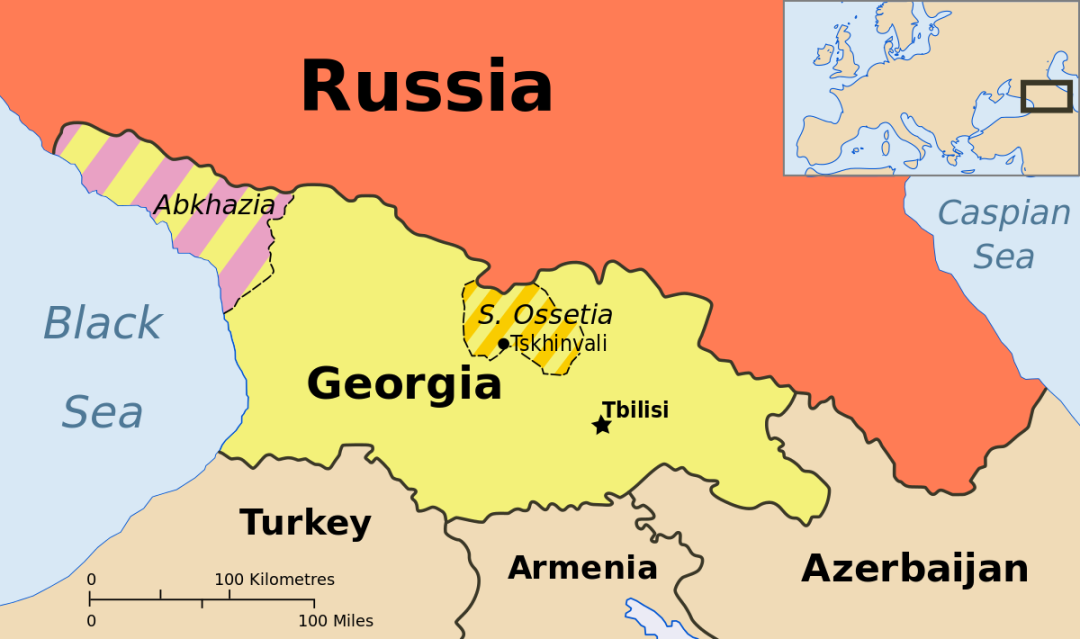
A New Phase in Georgian-Russian Ties

The relations between Georgia and Russia have entered a new phase. Traditionally characterized by animosity, Tbilisi and Moscow could now be aligning on regional geopolitical issues, potentially complicating Georgia’s pro-Western course.
After Russia invaded Georgia in 2008, the country has been partially occupied by Russian forces essentially in charge of 20% of Georgia’s internationally recognized territory. Diplomatic relations have been cut, and mutual animosity has prevailed. Yet, recently, traditionally hostile ties have shown signs of certain, if limited, rapprochement, which could have profound significance for how Georgia has been positioning itself geopolitically for decades.
The most recent development was the removal of the Georgian visa requirement following a decree by Russian President Vladimir Putin on May 10. The move is significant since the visa requirement was put in place more than 20 years ago, at a time when tensions between Georgia and Russia were first beginning to rise. Additionally, the decision to abolish a ban (put in place after protests in Tbilisi in 2019) on airline connections with Georgia was also proposed.
The two Russian initiatives have been positively received by Georgian officials, who argued that Russian airlines that have been sanctioned by the West will not be permitted to fly into Georgian airports. Meanwhile, Georgia's Western allies expressed disapproval and concern amid the generally complicated ties between Georgia and the EU, and the criticism of several Western ambassadors to Georgia has heightened Western concerns. This dynamic occurs while the EU is amid heightened debates on whether to grant Georgia candidate status.
It could be argued that Georgia and the EU are presently involved in a geopolitical tradeoff. The protracted war in Ukraine has forced the EU to reevaluate its energy and trade reliance on Russia and pushed it to look for alternative routes through which it could reach China and Central Asia. Since Georgia has a comfortable geographic position as the shortest land bridge between the EU and China, Brussels has increased its involvement in the South Caucasus. As a result, Georgia has gained significantly greater geopolitical leverage since 2022 than it had before the war in Ukraine. This new geopolitical reality may be the primary reason for Tbilisi's maneuvers on the foreign policy front, and it could be using potential rapprochement with Russia as a negotiating tactic.
However, it is far from certain that this course of action will make Georgia secure in the present widening geopolitical conflict between the collective West and Russia. Georgia has historically been susceptible to Russian influence because of the latter’s sheer size and geographic proximity. In light of this, maintaining a healthy balance between Russia and the West in Tbilisi's foreign policy has always been challenging and could become more so under present circumstances. Georgia presently might be involved in what may be an advantageous game, but in the long run, it could be entering uncharted waters with unexpected geopolitical risks.
The reasons for Russia's influence in Georgia vary, but perhaps beyond geography, the biggest challenge is the economic one. In 2022, Georgia’s exports to Russia increased by 6.8%, reaching $652 million. Imports from Russia increased by 79% to $1.8 billion. The amount of trade between Georgia and Russia rose from 11.4% to 13.1% in 2022, making it the highest level in the previous 16 years. Russia sent Georgia $2.1 billion in remittances last year, which is five times more than was registered in 2021.
When Georgia chose not to join Western sanctions imposed on Russia and exercised caution following the invasion, it first appeared to be a favorable tactical game. Now, however, maintaining the balance is difficult precisely because Russia's outsize economic and political influence is not properly counterbalanced by the West. Georgia’s hope to play the West and Russia and thereby develop a multi-vector foreign policy cannot be safely built when relations with the EU deteriorate – this leaves Russia exercising an excessive level of influence.
Realists might contend that geopolitical considerations may have contributed to the emerging understanding between Georgia and Russia. Yet it is unlikely to change Moscow’s prevalent view of Georgia and the latter’s relations with the West. Indeed, when Moscow issued its notorious ultimatum to the West in late 2021 as a precursor to the war in Ukraine, Georgia was included along with Ukraine as the two nations that Russia wanted to have their pro-Western policy changed. This included severing ties with NATO and, by extension, the EU too.
Therefore, irrespective of what kind of foreign policy maneuvering Georgia would be doing, the fundamental Russian perspective on regarding its southern neighbor is unlikely to change. Moscow will continue to insist on the idea that Georgia should officially renounce its pro-Western course and become more aligned with Russian multilateral initiatives.
In the longer run, though it is unlikely to improve Georgia-West ties, the awarding of EU candidate status may help to ameliorate the situation and dilute the growing alignment between Georgia and Russia. Perhaps Ukraine's military victory would change the balance of power too much in favor of the West. Until then, Georgia-Russia relations have entered a new phase characterized by uncertainties but also a silent understanding between the two capitals.
Emil Avdaliani is a professor of international relations at European University in Tbilisi, Georgia, and a scholar on the Silk Roads.





